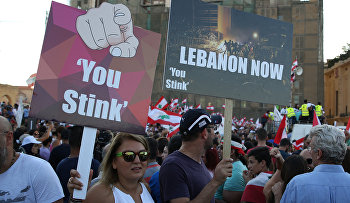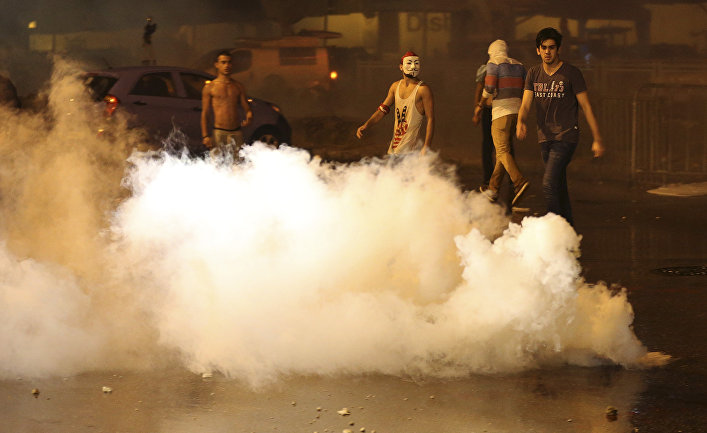“350 bucks?! I'm over my limit! I'll have to get my pals to pay my phone-bill.. 'cause I'm not working right now!” We're sitting with Assad Tebian on a café terrace in the Christian section of Beirut. The whole time we're talking, he never lets go of his smartphone. Never-ending Facebook status updates have burned through his mobile credit the last few weeks. But hey – the revolution's worth it, right?
“I'm no Marxist, I'm for a secular society,” Abbas Saad says. “I believe in democracy. Social justice, and a secular government. People define me as a liberal. Ok, put it this way, a leftist liberal.”
Although Abbas Saad is a Shiite, while Assad Tebilan is a Druze, neither put much importance on the differences. More than anything, they're Lebanese, and defenders of secular society. There's a new political generation emerging.
#YouStink Isn’t Another Arab Spring — It’s The Death Of Western-Born Monopoly Capitalism — http://t.co/OFAWMFKMKv
— Shuja Rabbani (@ShujaRabbani) October 13, 2015
The Garbage Crisis
For the past few weeks they've worked without stopping. They've created Facebook pages, uploaded YouTube clips, taken to the streets to protest the uselessness of the authorities. At first there were just a few of them. Now there are hundreds of thousands.
Assad Tebian is one of the founders of a group called “You Stink!” Abbas Saad is the president of the Secularist club at the American University of Beirut. And they all plan on changing Lebanon.
“When we started, it was just us,” Assad Tebian says. “We weren't leftists or rightists, just ordinary citizens who wanted to fix the garbage problem, and stop the water and power outages.”
Since the end of July he's not been off the street. And his hand's not been off his mobile.
Protest 2.0
When we first met Tebian in early October, he was still getting his website “You Stink!” together. He was justifiably moaning about the crawling speed of Internet access, how expensive the net was, and the almost total absence of widespread access, one of the country's most prevalent infrastructure problems.
His team was growing around him, a group of widely different young people united by ideals of secularism. Assad Tebian is a digital media specialist — but he still needs help. Together with web-designer Youssef Salame are giving up their time for the growing revolution. They were beginning the fine-tuning of the website test version, so that it could be up and running that evening. As well as that, they'd been planning their next demonstration.
“This time it's planned more as a festival than a display of power,” smiles Assad Tebian. “What'll the crowd size be? Hundreds? Thousands? Tens of thousands? We've no idea yet,” says an ironic Leen Hashem. She's one of the organizers, and is concerned that people might lose interest. (In fact, the festival nearly became a fiasco, with just a few hundred attendees, highlighting a possible slow-up, although fresh events are planned).
The symptom of a corrupt country
The “garbage” movement picked up speed this summer due to the backlogged piles of uncollected garbage in the streets of Beirut. The movement was launched by independent groups of students and young people, with only one objective, to fix the garbage problem. “People were amazed that trash was piling up outside their houses,” Tebian recalls. “That's why they joined in. But really it's just a symptom of all Lebanon's problems. It illustrates the corruption rife among all of the country's politicians.”
So next the protests expanded into opposition to the entire Lebanese political system. From the way government purchasing orders are made through to the lack of a national president and parliamentary speaker; from the stupefied political system to ecological catastrophes – every shortcoming in Lebanon was displayed for all to see. And they stank!
“Tear gas? That was cool!”
104 protesters were injured by the police in Beirut last night. 39 had to be hospitalised, 65 were treated on-site. http://t.co/M1Gwg7dFVv
— Mahmoud (@MahmoudRamsey) October 9, 2015
Assad Tebian almost never sleeps. He's on the streets the whole time. He's learned the hard way about the police, violence, and the riot police. “Tear gas? Sure, that was cool! Good experience!” he says. Despite reading George Orwell and Chilean poet Pablo Neruda, he doesn't think he is politicized. He says he has “learned everything from social networking.”
Later on he showed me the lebanonrevolts.com website with footage of this revolution, filmed and photographed by his friend Youssef Salame.
Abbas Sadd is almost never at home either. This unassuming student has become a political leader. A hero! Just like Tebian, people recognize him now in the street.
“The nucleus of the civil movement”
So, who are they? Who are these demonstrators, who have taken to the streets of Beirut and other major Lebanese cities in thousands since August this year?
“They're young, and want a secular society” says lawyer Ali Murad. “Mostly they're from the middle classes, and don't base their attitudes on religious affiliations. It's a movement aimed at achieving political objectives, but it does so without a party, and without political labels. They devised a great slogan, “You Stink!” — because it references both the mounds of garbage in the street, and the politicians too.”
“It's a rag-tag movement which is strongly focussed on social and human rights,” explains economist Kamal Hamdan. Meanwhile Pierre Abi-Saab — chief editor of newspaper “Al-Akhbar,” a close colleague of “oppositionists” and Hezbollah, a Christian Maronite, calls it “ the nucleus of the civil movement.”
Tear Gas and Water Cannons Injure Dozens at #Beirut Corruption Protest http://t.co/Yz50dgj5Al #طلعت_ريحتكم #YouStink pic.twitter.com/fLvbkcT2US
— Revolution News (@NewsRevo) October 8, 2015
Attempts at recovery
At the opposite end of the political spectrum, chief editor of the secularist website “Now Lebanon,” Hannin Ghaddar, says “it's a left-wing movement” in its similarity to the kind of protests and rebellions which typify activities organized by Occupy.
Over the past week, things have taken a more complex turn. The students and young activists have been joined by other movements, including “We Want Accountability,” “Change Is Coming,” “The People Want,” “To The Streets,” and “22nd August Revolution.”
These have been followed by political forces with clear origins in mass political demonstrations. Have they recovered? “The Lebanese Communist Party is in the game now, and so is Hezbollah” comments researcher Ali Murad. Murad claims “all traditional Lebanese groups have been severely weakened over this period.” This primarily affects the “Amal” Shiite movement (non-Hezbollah), the Druze led by Walid Joumblatt, the Le Futur grouping (Sunni, pro-Hariri), and the Christians of Michel Aoun — all uniformly denounced for their “inaction” or “incompetence.” “The Lebanese political scene is undergoing fundamental change – “You Stink!” have re-dealt the cards,” Ali Murad concludes.
Hezbollah helping on the sidelines
Despite the failure of the student component to bounce back. the movement is clearly left-leaning, and there are as many views within it as there are groups. There are both centre-left and radical-left factions. The younger members are now sitting alongside Lebanese communists and Trotskyites. And Hezbollah.
“Hezbollah somehow can't support “You Stink!”, because of the group's stated non-faith-based orientation,” explains Walid Charara, a researcher close to Hezbollah. Using measured words, he says “But at the same time, Hezbollah opposes Harirism.” Officially the General Secretary of Hezbollah, Hasan Nasrallah, has said that he supports “You Stink!” — but he would prefer his organization to remain on its sidelines.
“You won't find anyone supporting secularism out in the villages”
Abbas Saad, dressed in white shorts and an Armani polo shirt, is encouraging students at his university to come to Secularist Club meetings. He has no interest in depending on the old and corrupt political classes – including those on the left.
“Sure, the old leftists come along to our protests, and sing songs” says Saad, “but they're all old songs from the 1970s! We need new songs, new ideas, if we're going to change the culture of this country” he says, as we go on a demo in Beirut West. He shows me a website criticizing the Shiite leader Nabih Berri, who has held his political position for the past 23 years.

Saad comes from a poor Shiite family in the south of Lebanon. “There's no-one supporting secularism out in those villages, no-one. They only support Shiite activists,” he says about the Hezbollah-controlled region. He knows exactly what the price of such independence can be. He stayed there until he finished school, before getting a USAID grant, and continuing his studies at the American University of Beirut.
Dying for their ideas
It was in that secularist incubator that he got his political education, by reading Edward Said (“too literary”), Noam Chomsky (“too anti-imperialist”), and the American philosopher John Rawls — and he now declares himself a 'Rawlsian'. His principle inspiration was the murder of the famous journalist Samir Kassir in 2005, a figure who was against Syria and Hezbollah, a symbol of an independent Lebanon. “They killed him for what he wrote – he died for his ideas,” Saad repeats. Saad says that he “supports the Charlie Hebdo journalists 100%.”
#Beirut protest turns violent, officials stall talks http://t.co/OXf4grSDCn pic.twitter.com/Xankr9Jywd
— Al Arabiya English (@AlArabiya_Eng) October 8, 2015
It was Kassir's murder that plunged the then-engineering student into politics. “Now it's philosophy and politics that interest me. I'm trying to find a new way forwards.” As if applied science isn't enough for militant activities.
Ecology and LGBT rights
Abbas Saad, Asad Tebian and the thousands of others who went into the streets typify the new Lebanon. Young people are no longer willing to put up with religious sectarianism, and come out in support of equality for women, protection for the environment, equal rights for Palestinians, and – a true rarity in the Arab world – gay and LGBT rights. They are young people who believe in mixed marriages, and above all, a secular society… a term that has a magic ring to it for them.
Night has fallen over Beirut. Assad Tebian, Youssef Salame and a small group of programmers are poring over the website. “A few more lines of code, and we've got it” says Salame. “We need to put a Contacts page in.” And so the work goes on. At last, it's all ready. The counter is running. The youstink.org site is up. The garbage crisis has already got its own pages on Facebook, Instagram, and Twitter, but now it has its own official voice – its own official website.






